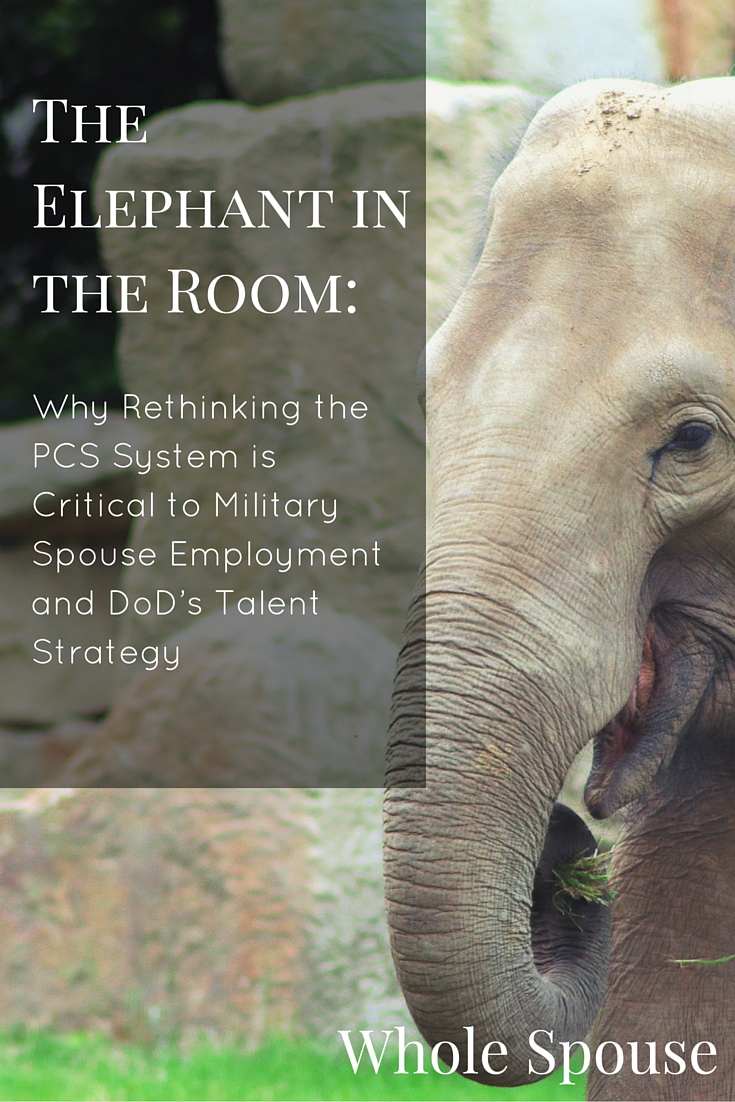Meet Brenda, an Air Force spouse of 14 years and mother of three. Originally an accountant, Brenda recently re-entered the workforce in the real estate field, but is finding it difficult to fit employment into her military life. The following excerpt is taken from an interview I conducted with Brenda in Germany, asking her about her career journey. In order to protect her identity, I am not using Brenda’s real name. Here is Brenda’s story in her own words…
I got married at 30. I had worked all my life. It wasn’t ever really a consideration that I not work. I had worked through school, worked hard, was a CPA. I paid a lot of money for school loans, and was still paying them off, so (work) was important to me. I didn’t know any different. It was an automatic thing to go find a job. I mean it was pretty normal as to what everyone else in the world does.
But when I had my son I stopped working altogether. We were getting ready to move anyway, and you have a new baby, and you don’t know what you’re doing. So it worked out at that point. We both thought it was important and it didn’t hurt us not to work at that time because I was going to quit soon anyway because of the move. That was the first time that I quit a job to move.
Back then it felt like (I had options). I don’t think there’s very many mothers of newborn babies that want to go back to work right way. It does feel like you’re essentially being gifted something. Especially with my background, working my way through college, and then working the whole time, it did feel like kind of a gift. It was nice not to have to go back to work. Financially, yes of course, more money would have been nice. But it wasn’t the most important thing at that time. So it did kind of feel luxurious. I had options in that it wasn’t necessary for me to go right back to work after I had my son.
And I was thinking, “Well, I’ll stay home for five years. When my son goes to kindergarten then I’ll go back to work, and I’ll go back on my thing.” That’s what everyone I knew did or had to do. So I think that was my mindset. Okay, I’ll have kids. And because of that mindset I had my son. And then directly after that we had decided that we wanted to have another child. And I said, “Well, it has to be now because I have five years.” Maybe I can stretch it to six, but we got pregnant right away and then we had twins. So I had three kids in eighteen months because I was thinking the way I had always thought. When these two kids were in kindergarten I was going back to work.
When I found out we were going to Scott, I wasn’t terribly excited about it. I didn’t even try to work in Illinois because I knew it was impossible just having the kids. So I think that was the biggest assignment that kind of, not devastated me, but kind of changed me.
Not only did we move to Scott, but we ended up moving on base. I had never been around the military, so it was kind of culture shock. And I remember living on base and my girlfriend saying one time, “Oh, you’re one of those people. You know you live on base. You shop at that base store. You shop at that base grocery store. Your kids are going to go to that base school.” I mean that was kind of shocking to me because I always envisioned myself as this really open-minded free spirit. I’ll try anything. And then all of a sudden I’m in my small world. My identity changed, or what I thought my identity was.
When we left New Jersey (for Scott), that was my first thought, “Why do you even try to work, because we’re only going to be there for two and a half years?” You can’t get anywhere in two and a half years. You can’t progress. Who wants to hire me for two and a half years? I’m not going to lie and say that we’re going to be here for six years, because that’s not how you do business. So it changes your mindset, and it changes your motivation, because really can you? Can you do all these things that in your mind you built up for yourself? I mean you can if you want to hit your head against the wall. I was kind of disheartened. It’s kind of like it doesn’t matter how hard I try in this arena, I’m not going to get anywhere.
No matter how many people tell you that motherhood is noble and good and all that, you still have it in your mind like, “Yeah right. I should be doing something more.” I think we always want to see the fruits of it. When you go to work you get the paycheck. You get the accolade. When you stay home you don’t get any of that, not in the short term. You get it when you have great kids at the end. But when your kids are screaming in Wal-Mart and you’ve tried your best and you’re doing everything possible, you just don’t see. When you clean the house perfectly spic and span and in half an hour it’s just as crazy as when you started, you just don’t have those cues that you’re doing a good job, or that you’re doing anything really.
At work, people are looking at you to do your job. And when you’re at home, you’re trying to get people to look at you. People are constantly critiquing your work or looking at your work or praising your work or criticizing your work. They’re always looking. But when you’re at home, you’re trying to get someone to acknowledge that you’re doing something of worth but no one’s looking. Maybe your husband looks every once in a while. Maybe your mother-in-law looks every once in a while. But really no one’s looking.
The other thing is that our husbands have such interesting jobs. No matter what their job is they’re well-traveled. They’re doing something interesting and brave and noble. And not that you’re competing, but that’s always very interesting to people. And nobody’s really interested in how many diapers you changed. When you’re not working I think a lot of people assume that you have nothing to say or nothing to offer. I got tired of that too. It’s like, “Where did you fly today or how is it down in Abu Dhabi or Djibouti?” All these exotic interesting places that no one gets to see or know about. And then, “Brenda how was the mall today?”
(During) the first assignment I didn’t know (what this would be like). I knew that we moved, but I didn’t realize about the jobs, and I didn’t realize about my changing. That was just dumb on my part. I mean you realize that things are going to change. But, I really didn’t know. This is really hard. I always thought that I was a really strong person. I moved to Germany by myself. I’m independent. I’m fine. And yeah, I think it’s hard. It’s harder than anybody can imagine.
I have a little bit of resentment. I mean, there’s just no question. It always falls to me. There’s no question of who’s going to take care of everything, who’s going to get the dishwasher fixed, who’s going to all those things. I don’t even ask my husband anymore. If something’s broke in the house I figure it out. If I need something moved, some furniture, I figure out how to move it. I don’t wait, because I get frustrated waiting. I’m sure it hurts my husband’s feelings, but I always tell him, “I can’t depend on you. Not that I can’t depend on you, but I can’t wait for you, because then I’m just too frustrated. I get upset because you’ve been gone. For example, I’ve been wanting to move this piece of furniture that’s too heavy for me, so I’ve waited for four months. And now you’re home and you’re still too tired or jet lagged for two more weeks to move it. And every day that you’re home I’m looking at this piece of furniture thinking how I’ve been waiting for four months to move it.” It’s just easier for me to get a hernia and move it, and that’s what it is. Instead of looking at it I’ll call four girls whose husbands are also gone, and we’ll move the furniture. So there’s just not a question of who it’s going to fall to. It’s always going to fall to me, because you have this job that I don’t want to say is your excuse job, but it is. It kind of gets you off of any responsibility at home until you want to jump back in. I don’t have a choice to jump out and in. I always have to be the leveling figure, the one that makes everything happen and everything smooth at home. And not that that’s bad, but there’s no chance of me getting a real job or a career.
So the Andrews (assignment) is when my twins, my youngest kids, went to kindergarten. In my mind, they’re in kindergarten, so I was going to try to do a little something. The Williams Sonoma job was the hardest job I’ve ever had. And it was not because of the work. It was because I was trying to figure out how to squeeze it all in. I was trying to figure out how to still do all of my stuff that I needed to do because it’s established that I do all these things now, that I cook, clean, garden, take care of the kids, do the homework, and all these things. That’s my established role at this point. And now I’m adding 15 whole hours a week, but it was very hard. It was very hard to put those little hours in. Even though the kids are in school, that 15 hours a week takes away from all those responsibilities that I’m in charge of because he is working. So those fifteen hours a week took away from picking up the stuff.
It was devastating to think that I can’t (do this). I mean, in my mind I’m thinking I used to work 60 hours a week. Are you kidding? It’s devastating to think that I don’t even have 15 hours a week that I could pursue something, that all of my efforts go to the care and the support of other people. That’s okay, but at some point you wish that you had some support. Everyone talks about, “Oh you guys make great money in the military.” But it’s not great money if it doesn’t allow me to have a job. So you’re paying for two people really, which he works enough for two people.
It still changes my whole attitude and my whole belief in what’s possible. It’s very sad for me that you can’t do anything really. It’s tough as I’m quitting another job because of this.
Brenda begins to cry…
It’s frustrating. Like, the Hallmark job, all I had to do was place cards in the slots in the grocery store and order more cards. I think those jobs were something to do, to talk to people and get out and see what was going on after being with babies for five years. And the frustrating thing is that doing even these little jobs wasn’t possible. That was the devastating part.
I was angry that my husband and his pursuing everything for our country didn’t leave me 10 hours a week to place cards in slots. I think that’s what it comes down to. It’s always feeling like that you have to be the one in charge, or the one that does everything for your family to the point that you can’t have a little 10 hour a week job. That’s the issue that I have with my husband, not that he can do anything about it.
When you got to Germany, what were your hopes and expectations about working?
So I started working in January, and it’s a busy job. I mean it’s a very busy job. My kids are now in fourth and fifth grade. So I was thinking they should be a little bit more independent. It’s okay. I have a telephone from nine to six that I answer, and I work from nine to three. And so pretty much I don’t do anything outside of that. But the problem here is that we have so many people visiting, in-laws and that kind of thing. And when (my husband) has time we’d like to travel, which is kind of the point of coming here and giving our kids that experience. But it’s a great job. I really like it. It’s one of those things where it’s fulfilling. I talk to all different people. I get to do some marketing. It’s really a great job, but my husband still sees my role as that support role. So when his parents come and he’s on a trip for work I’m still the one responsible for taking care of everyone when they come. So when you have people coming every two weeks, and he’s getting deployed for six months, there’s just no way for me to do a job.
How did you come to the point of deciding you couldn’t do this job?
No, it wasn’t my decision. I think my husband is so used to me being around and not working that he really doesn’t want me to. I mean he really doesn’t like it.
Even though this job was his idea in the first place?
It’s the reality of me working every day, having a phone, and not everything in our house being perfect, because it’s not anymore. The floor’s not always mopped because I’m working. Then I pick up the kids and we do homework and we go to baseball. Then we come home and I throw something together for dinner. So we’ve had a lot of problems because he doesn’t like it. It’s not running the way he thinks it should run. And he’s a good guy. He’s totally not like one of those ‘60’s guys, but I think it’s been established through our marriage. And it’s different now because he’s never had to do anything. He’s never, not once, cooked a meal. He does other things, but he’s never been in our kitchen.
It’s so stressful. Obviously it’s easier if I don’t do (the job), because I’m doing a lot. I’m working very hard at home with the kids and at work because our life has determined that my husband doesn’t have any role in our home life and the running of it. So it hasn’t changed. I’ve just added a job. So I am tired. I remember someone said when I got married, “Establish the way you want it to be before. Don’t mow the lawn if you don’t plan to mow the lawn for the next 40 years.” Now I wish I would have listened to this tidbit of advice. And it’s frustrating for me. But now I really truly feel as if my role is to be the support, to make sure that my husband gets someplace in his career, wherever he wants to go, and that my kids get wherever they want to go in their lives, which is what I would want to do for my kids anyway. But somehow with the husband thing I’m getting a little bit more and more resentful as I see that it’s so one-sided. There’s that expectation through the years that we promote his career to my non-promotion of anything I want to do. And I love him. He’s a great man. He’s a really good guy. It’s just the establishment of the life. You do what you have to do to make it work. And that’s what it’s always had to be. We’ll see.
I just don’t feel like I’ve had any control over the development of my life. It’s just like I said. You just follow and do what you have to do to make everything work. So, I feel like you don’t have any control. And you don’t have really any say or any play with where you can go or what you can do. You feel limited.
You know I don’t know if I have energy (for working). I really think I’m just exhausted. I think I’ve banged my head against the wall. And I think that at this point, 15 years later, it would take so much energy to get back into something, a profession, that I don’t know if I have the energy after promoting his career for (so long). I’m tired. I’m exhausted and I don’t have anything to show for it personally. I mean we do. We always used to laugh at those women that wore their husband’s rank or whatever. But now I’m thinking, “She worked just as hard at it as he did so why shouldn’t she?” Not that I’d ever do that because it’s kind of weird. But I can see how it happens. I can especially those commanders’ wives. My experience with not doing what I wanted to do work-wise was because of our family situation. But there are those women that don’t do what they could be doing work-wise because of their husband’s career. And I don’t know why they wouldn’t wear their husband’s rank. It’s not an easy life. I mean I’d still choose it because I love him, but hmmm… Would it have been a bad thing if he was a doctor or an electrical engineer? I don’t know.





